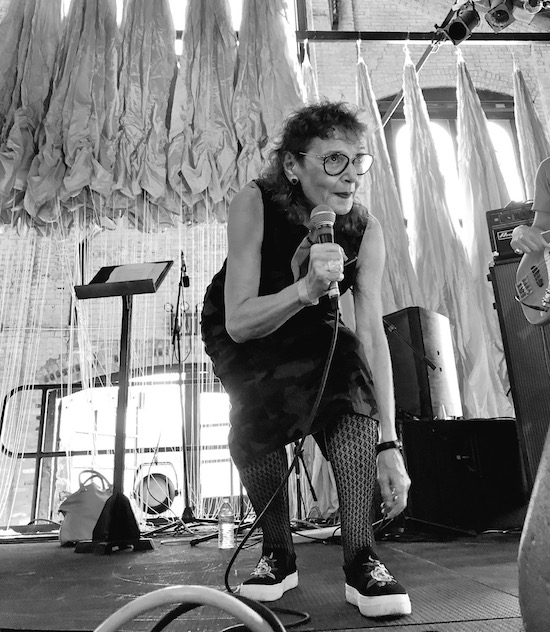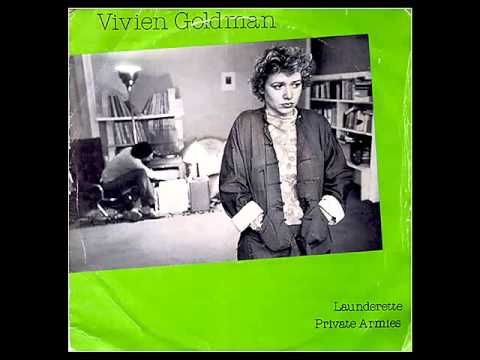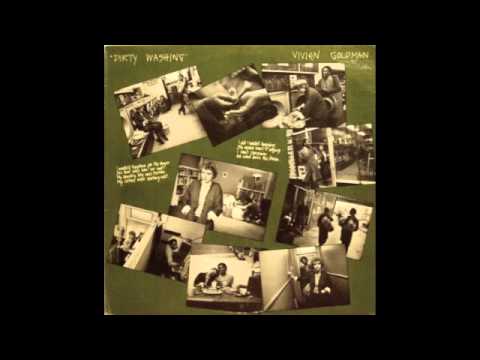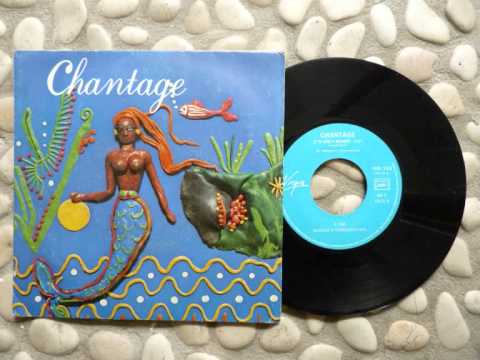Vivien Goldman has been very busy of late. But for those who have followed this Briton’s long and prolific career in its various forms since the 1970s – music journalist, author, publicist, broadcaster, playwright, and professor – her dogged work ethic is not that surprising. At the moment, she is currently working on two book projects that are polar opposite of each other: one tentatively titled Revenge Of The She-Punks, about women in punk, and the other on Lemi Ghariokwu, who is best known as the artist for Fela Kuti. Most recently Goldman appeared in the Slits documentary film, Here To Be Heard and wrote an essay about the acclaimed Beninese singer Angelique Kidjo for an upcoming book anthology titled Women Who Rock. “I think I am quite driven, aren’t I?” she said rather matter-of-factly. “You got to do something. This is what I do.”
For over 40 years, the outspoken and cheerful London-born writer has been the unofficial chronicler and champion of punk and reggae, having long documented their intersection with each other, revolutionary messages, and cultural impact. But it’s not just punk and reggae — she’s pretty much written about all genres of music for the weeklies Sounds, Melody Maker and NME during the 70s and early 80s. Goldman has interviewed such acts as the Slits, Ornette Coleman, Captain Beefheart, Brian Eno, Richard Hell, the B-52s, Patti Smith, Jimmy Cliff, Talking Heads, and Chaka Khan; reviewed records by the Doors, Lou Reed and Millie Jackson; and reported on live performances by Laura Nyro, Bill Monroe, the Clash, and David Bowie.
“Vivien was there on the front lines at such a crucial time for music, culture and politics,” said Evelyn McDonnell, the American music journalist and the editor of the aforementioned Women Who Rock (she also wrote about Goldman for National Public Radio in 2016). “And because she’s such an open, caring soul, she embraced the varieties of music that were percolating in London and Paris, and eventually New York: punk, reggae, Afrobeat, disco. She is the punky reggae party of which Bob Marley sang. She was also a rare female in the very male world of the inkies, and that was important, as she was a crucial ally and proponent of the important girl-powered acts of the time, from the Slits to Raincoats to Judy Mowatt to Pretenders to X-Ray Spex. And she is a brilliant, engaging, funny, and insightful writer. It’s not only significant that she was there in Jamaica with Marley; it’s also important how vividly she documented that scene.”
Despite her current writing projects, Goldman, who is now lives in New York City, is making time for an appearance this summer in Berlin, not at an academic conference or a bookshop, but on a performance stage at the Pop-Kultur festival in Berlin. Perhaps somewhat unknown amid her professional accomplishments was her recording career from the late 1970s to the early 1980s as a solo artist and a member of the Flying Lizards and Chantage. Two years ago, her recordings from that period were collected and released on the album Resolutionary, which was favorably reviewed in Pitchfork. In promotion of that record, Goldman sang live under her own name at Rough Trade East in 2016; she followed that rare performance with another concert a year later at Basilica Hudson in upstate New York.
For this upcoming concert in Berlin, Goldman will be accompanied by singer and ukulele player Louise Taylor and bassist Max Hirtz-Wolf. In addition to performing material from the Resolutionary record, Goldman will also be debuting some new songs that she has written with Killing Joke’s Youth and her longtime music partner Andy Cane. “I was never really driven to perform,” said the writer-academic-singer. “I was more like a studio rat. I just enjoyed songwriting and working with people. I was also a journalist and I just never went to that place. But now it’s a different time. I’m quite looking forward to it.”
Prior to making those recordings, Goldman had already established herself as a music publicist (she did PR work for Bob Marley at Island Records early on) and writer. But performing music wasn’t exactly foreign to her. “My father was a musician,” she said. ”We used to sing together at home. It was so natural. I never thought of being a musician, just as I never thought of going on stage because I’m sure it had a lot to do with the fact that I was a female. I certainly wasn’t a frustrated musician. It was just a part of me.”
That desire to get involved in the music could be traced to the arrival of punk, which had a profound influence on Goldman; it was the first youth movement that she was a part of. “I remember how different it was in the 50s for women. I was very little, but I got the vibe. It was not easy being a female then because the only way was to get married. It wasn’t encouraging, this prospect of growing up to womanhood. Even in the 60s when I was at school, there still wasn’t at all the freedom that punk afforded. That’s why I can speak authoritatively that punk changed everything for girls. I wouldn’t have been able to be me. I’d have been very marginal if punk hadn’t coincided with my development.”
Goldman was further inspired by female-fronted British punk rockers such as the Slits and the Raincoats. “Suddenly I had mates,” she recalled. “It wasn’t mostly me alone with some raucous lads who didn’t want women around. The Slits would pull me up on stage. I used to do a lot of backing vocals for reggae records with Ari Up and Neneh Cherry because I was around people who would hear me sing and think, ‘Oh, she could be useful.’”
According to Goldman, David Cunningham, a co-founder of the post-punk outfit the Flying Lizards (who would be best known for their unique interpretation of Barrett Strong’s ‘Money’), heard her sing. She joined the collective that also featured David Toop, Steve Beresford, and Deborah Evans-Stickland; other collaborators included Robert Fripp and Michael Nyman. (Interestingly Toop, Beresford, Cunningham, and Goldman all became teachers.) It was a very artistic community in a pre-gentrified time, Goldman remembered. “Robert Fripp was always very open,” she said. “I knew [Robert Wyatt] through Brian Eno, who was a neighbour. At that time you could be bohemian in the cities, and somebody who was better set up financially, like Brian Eno, could be living around the corner from me because of sociological circumstances. It wasn’t that weird.”
Goldman wrote two songs for the Flying Lizards’ 1979 self-titled debut record — ‘The Window’ and ‘Her Story’ — both of which showcased her high voice and feminist-minded songwriting. Nearly 40 years later, those two songs seem timely now in the #MeToo era. “It was what was going on,” she said. “It’s a symptom of not having so many undoctored women’s voices. Whereas for me, through circumstances and the energy of the community, I was able to go out and record what I felt. I wasn’t trying to be a pop artist. It was just free expression. Women weren’t always as free to sing their own song at that point with so many cultural gatekeepers. Punk came along and changed all that.”
If punk was crucial in Goldman’s development, so was reggae. Recalling such acts as Steel Pulse, Aswad, and the performers of lovers rock, Goldman cited reggae’s energy and aim towards a higher level of consciousness as well as its rebel spirit. “It had that elevating effect,” she said, “and it gave us the idea that we were all soldiers, an army bound by music.” She was further exposed to reggae culture when she moved to Ladbroke Grove, which was a West Indian neighborhood. “They had all these incredible late-night clubs that were illegal, held in the basement of abandoned houses and all sorts of places because people weren’t accepted by the establishment,” she said. “There was only pretty much one black club in the West End, Columbo’s. So they made their own entertainment with the sound systems that they would build, and the record collections they would bring over from Jamaica. To me it was a great scene.”
Goldman recorded music under her own name beginning in 1981 with the quirky and anti-romantic post-punk/reggae single ‘Launderette’. Public Image Ltd’s John Lydon and Keith Levene co-produced the track. “I had this good friend, George Oban,” she recalled, “and he was the bass player of Aswad, the British reggae group for whom I used to do PR for at Island. He played me this bass line which was so snakey and sinuous. I improvised the song right there there. It’s like a song that wrote itself.”
Goldman played a cassette featuring the ‘Launderette’ demo for her friend Lydon, both of whom shared a love for reggae. “He just laughed because it’s quite funny,” she recalled. “It was very much like the way romance was at that time in punk era, a certain level of detachment and cynicism. He said, ‘Let’s pursue it.’” She was also able to take advantage of PiL’s studio time to record the song. “Basically they were doing The Flowers Of Romance and they were going through a very tortuous time redefining themselves,” Goldman said of PiL. “Jah Wobble had left, and they didn’t have a bass. So they spent a lot of time in their rooms angsting and being creative. In that time, I would knock on the door of the studio and they would let me use their downtime. I recorded it and then it was finished on Berry Street in Soho where a lot of reggae work was done. I think everyone was amused by ‘Launderette’, it has a charm. It was so typical of the time.” Robert Wyatt also provided percussion on that track. “He really had significant input,” said Goldman.”I didn’t really have a vision of the drums, but he knew what just to do, so delicate and instinctive. Even now, people refer to that sound of ‘Launderette’—it’s tough but light.”
The most political punk statement that Goldman recorded during this period was the ominous ‘Private Armies’. A commentary on violence, the song described a real-life incident involving Goldman’s two black friends Vernon and Norman who, while sitting in a vehicle, witnessed skinheads beating up a fellow black man on the street. The message of the song is further driven home by the lyric “If you can’t get a hard-on, get a gun”. “To me it was emblematic of the impotence that we sometimes feel,” she said of the song’s theme, “an impotence that we have to somehow find the hope to overcome. “It made me think on a macrocosmic level all the violence that filters down to the little incident on the street. I’m sure the guy they were beating up on the street wasn’t killed, but it made me think of what we see in such an exaggerated way now — governments of such unbelievable callousness.”
Like her previous songs that addressed feminism and gender inequity, the sense of strife evoked by ‘Private Armies’ also seems prophetic in the context of today’s problems and traumas, ranging from America’s gun epidemic to anti-immigrant sentiment. The political consciousness echoed by that song is relevant to Goldman’s own family history — her Jewish parents escaped from Germany during the Nazi era. “This is the situation we see,” she explained about today, “because those controlling 1-percent types like to gang up and make half the world unlivable in order to extract their precious metals and what have you. And then we have this massive wave of refugees and immigrants [in Europe]. They [the 1-percenters] viciously and callously for their own selfish greedy end displace a chunk of the world. Now the world is in turmoil, and it’s based on those attitudes from ‘Private Armies’ to me.”
In the early 80s, Goldman collaborated with Eve Blouin to form the duo Chantage. Their brief African/Caribbean-influenced recorded output included the wry ‘It’s Only Money’, produced by Adrian Sherwood, who also worked on ‘Private Armies’. After Chantage, Goldman continued on with her writing career for the next three decades that included penning articles for The New York Times and The Guardian, as well authoring books about reggae, Bob Marley, and Kid Creole and the Coconuts (she later collaborated with Kid Creole on the 2016 musical Cherchez la Femme). Today she still spreads the gospel of punk and reggae — this time to a new generation as a teacher at New York University, rightfully earning her the nickname of the ‘Punk Professor’.
In addition to her upcoming book on punk rock women, Goldman is focused on her other project about Lemi Ghariokwu, the Nigerian artist responsible for Fela Kuti’s album visuals. In talking about the book’s long gestation process, she may have unintentionally but aptly referenced her unflappable work ethic: “I think a keyword to me is tenacity. I really think you have to stick with things if you believe in them, even if other people think you’re nuts. If you know that it needs that bit more effort to make it happen, and you really believe in it, don’t you think you should stick with it?”
“I think of Vivien as truly embodying the notion of the free spirit,” said Goldman’s friend McDonnell. “She follows her beliefs, passions, and loves wherever they take her: to different careers, platforms, countries. She won’t do a job she doesn’t believe in, and she will pursue passion projects for years, decades, even, without a tangible reward in sight. I also think she gets bored very easily, and likes to take on new challenges. I love that she has never locked herself into a career or pocket. I envy that.”
With her imminent Pop-Kultur appearance, I asked Goldman if would she ever consider recording new music again to follow up what she made nearly 40 years ago. Her response was noncommittal, but she didn’t completely count out that idea. “There’s a chance,” she said. “We’ll see how that goes. It would make sense in a way because I’ve got these [new] songs. I have a feeling that once I work up these songs, I’ll want to lay them down somehow. So I’m in the middle of cooking the meal. By the time I get to Berlin, it will be a gourmet dish!” [LAUGHS]
Vivien Goldman will be performing at the Pop-Kultur conference in Berlin on August 17






